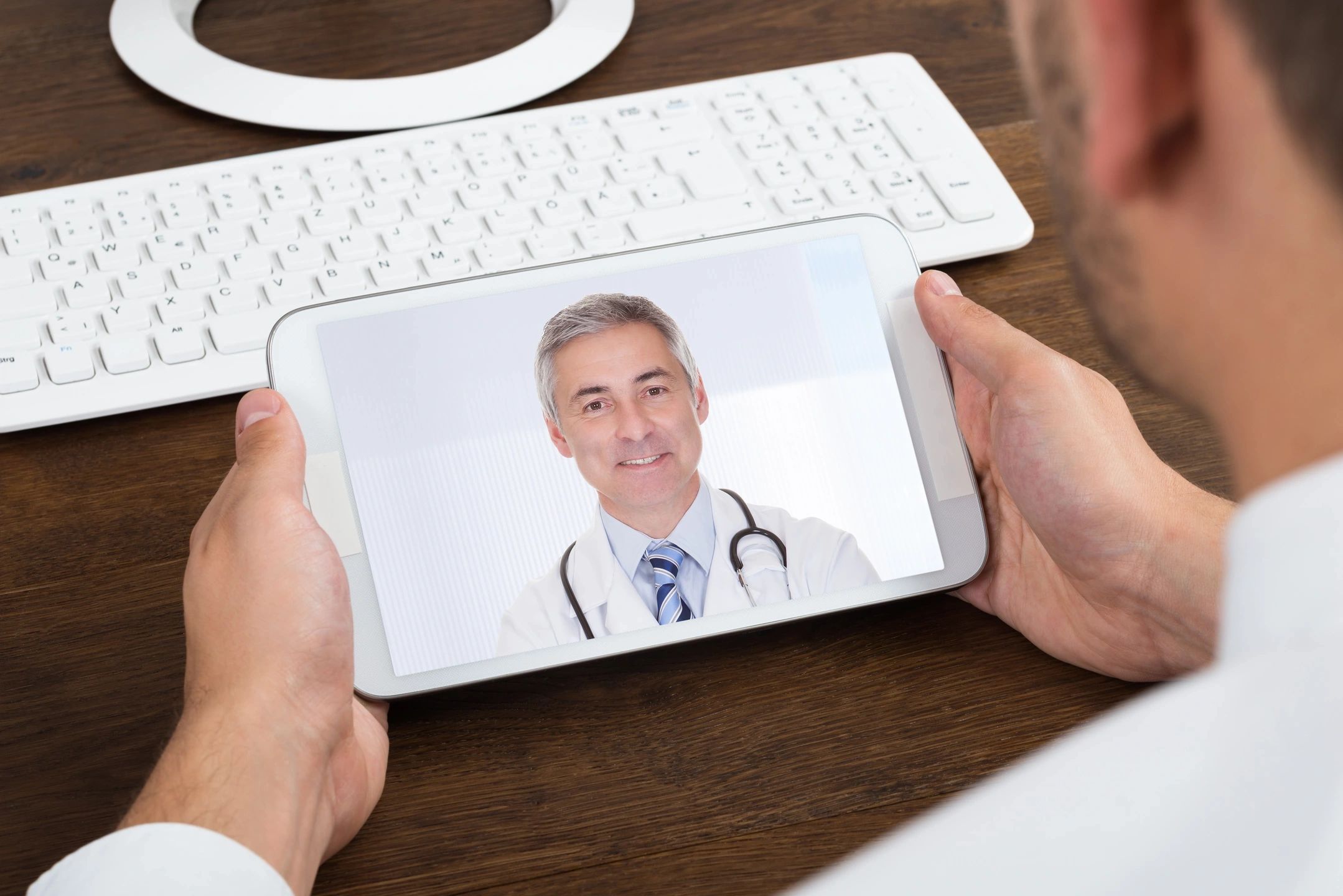In this blog post we will discuss when it is appropriate for a telemed or telehealth visit and if there are times when a face-to-face visit with the doctor is best. We will discuss the pros and cons of telehealth and address some barriers to accessing this virtual visit.
What is telehealth? This is a virtual appointment with your doctor that can be done over the internet on a computer, a smartphone, or a tablet such as an iPad. You can both see each other and have a conversation regarding your health issues or follow up concerns that need to be addressed. A virtual or telehealth visit can also be done over the phone.
Telehealth has become a popular way to stay in touch with patients since we entered the pandemic. Isolating from others and still needing healthcare became a challenge that telehealth came to the rescue for many types of doctor visits.
We will address the pros and cons and then discuss them a bit further.
1. Pros
- Reduced travel time to and from the doctor.
- You don’t have to leave your home to see the doctor.
- Eliminates transportation issues on finding a ride to your doctor’s appointment.
- It is a great option for people living in rural communities where you have increased travel time to the doctor.
- Avoids longer periods of time for missed work.
- You may not feel well enough to go out to see the doctor.
- You can be away from home and still access your doctor. For example, you are staying with a relative away from home and you can still keep your appointment.
- While traveling, telehealth gives you access to a provider at any time.
- You can maintain safety and privacy through secure networks with your clinic or provider
- Communicate with your doctor by sending secure messages back and forth like using email but from their clinic or hospital portal or system.
- The ability to have a disease or illness monitored from home with special equipment or other protocols set up. For example, our Mayo Health System in our area has a remote Congestive Heart Failure Disease Home Monitoring Program that will review you condition, monitor your weights, etc.
- Can help to reduce Health Care Costs.
- Video visits and using technology can often improve the quality of healthcare you receive by having a better opportunity to communicate with your doctor via messaging. You can email using your clinic’s Patient Portal, My Chart, or whatever your system calls it to stay in closer touch with your doctor. You can answer a question and you doctor can answer when they have a moment to look at your record. You are not making increased phone calls trying to reach you doctor and your doctor will contact you when he or she has a few moments to address your concerns effectively. Technology can make it easier to get in touch with your doctor and even your specialist.
- Health related apps that can be added to your smartphone can track all kinds of things such as heart rate and oxygen saturation levels you can report to your doctor during a telehealth visit.

2. Cons:
- Telehealth visits are not appropriate for emergencies or conditions where the doctor needs to lay their eyes and hands on you to best assess the health concern.
- *Tests cannot get done and the possibility of more antibiotics prescribed exists with telehealth visits most notably in the pediatric patients.
- The ability for our elders to access and use the technology needed to attend a virtual visit.
- *Lower income families may not have access to the technology needed for virtual visits and will do more “phone” visits.
- Speaking with a doctor that may not know you and you don’t know them. The provider might not be familiar with your medical records.
- You might have technology issues that prevent your visit from happening. For example, we live in a rural community and use satellite internet and if it is raining or storming, we will not have internet service.
- During my research one of the topics that came up as a “con” for using telehealth visits is that many people ore distracted during their visit. They are “surfing the web” answering emails, playing games on the computer and are not giving their full attention to their appointment. Missed information and instructions occur. You must be prepared to give your full attention to your doctor.
When are the video doctor visits most effective?
Video visits are a great alternative for follow up visits. For example, Ruth has had a change in her diabetic medication and the doctor wants a follow up visit. Ruth may not need the doctor to physically examine her but the physician will want to review her record of her blood sugars and how she has been eating. This would be a very appropriate use of a telehealth visit.

What are some reasons that telehealth visits might not be appropriate?
We will give you some examples that may not be appropriately treated with a telehealth visit.
- You just had a hip fracture and surgery and your follow up visit may need an x-ray to determine how well you are doing.
- You are having symptoms that would require you to get immediate blood tests done.
- You are having severe symptoms such as chest pain or stroke symptoms and you need immediate and emergent medical care.
- You have had an injury requiring urgent care such as a broken bone or a cut needing stitches.
- You are in need of some type of procedure for your health maintenance such as a mammogram, colonoscopy, or a woman’s pelvic exam.
FAQ’s
- Will my insurance pay for my telehealth visits?
Often time insurance companies will pay for virtual visits at the same rate as an office visit. All insurance companies are different, and you need to know your benefits. Check with your insurance company to see if virtual visits are covered
2. Will Medicare cover Telehealth or Telemed visits?
Prior to the pandemic, Medicare only paid for virtual visits if you lived in a rural area. Now they have made exceptions due to the climate we are faced with. As of 2022, at the time of this article Medicare will pay for telehealth visits even if you are not in a rural area for the following reasons: (These came from the Manual Medicare and You 2022.)
- Monthly End-Stage Renal Disease visits for home dialysis.
- Services for diagnosis, evaluation, or treatment for evaluation of stroke-like symptoms including a mobile stroke unit and wherever you are.
- Services to treat a substance use disorder or a co-occurring mental health disorder sometimes called “dual-disorder” in your home.
- These visits are paid as an outpatient visit under Part B and subject to 20% co-pay.
- Medicare Advantage Plans run by commercial insurance companies may provide a more robust selection of telehealth visits no matter where you live. Once again, please check with the insurance company providing your Medicare Advantage Plan benefits.
3. What if I am not good at technology?

Many senior centers, aging and disability resource centers have computers at their office and offer assistance to seniors needing help with managing the technology. There are resources out there we will put in our directory that work with seniors to teach and educate them on how to use the technology needed to participate in virtual visits. This is a great opportunity for grandchildren to spend some quality time with their grandparents and teach them how to use a computer, smartphone, or tablet. (See our blog post on Apps to help make caregiving easier)
According to the article “Overcoming Telehealth Barriers and Engaging Older Adults in Virtual Care”, Almost 25% of our seniors did not have access to a smartphone or a computer or tablet to be able to participate in virtual visits. This doesn’t completely rule out a virtual visit but it makes it a little more difficult. Telehealth visits with no access or knowledge to manage the technology needed will result in a phone call with your provider. This is better than nothing but this method takes away the ability of the physician to see you during your visit.
Many concerns related to aging can impair a senior’s ability to participate such as dementia, lack of good hearing, lack of a smartphone or computer, or plan and simple their unwillingness to use one of these devices. Many seniors are set in their ways and do not want to learn. Seniors are at risk for many “scams” and your family member may be leery of potential security issues and risks to their personal information.

Getting Ready for your Virtual Visit-Get the checklist HERE
- Keep accurate records in-between doctor appointments. This could include recorded blood pressure readings, blood sugar logs, and daily weights. This could even mean having your temperature taken and recorded and ready to go for your virtual visit. Have these recorded or written logs ready to go when the video visit starts.
- Write down the visit on your calendar. Treat this visit the same as any other appointment.
- Allow enough time to log in and allow for a few minor technological challenges when getting ready to log on.
- Do a practice run with logging in and making sure you know how to get the telehealth visit started. You should get an email with a link to click on to get you on the scheduled video visit.
- Have paper, pencil or pen ready to take notes.
- Make sure you have your current list of medications handy so you and your doctor can make any necessary changes.
- Prior to your visit, write down any questions you might have to make sure all your needs are addressed during your video visit or phone call visit.
- Make a list of your symptoms if any. How are you feeling? Write down what you want your doctor to know.
- Fully be prepared to give your physician your undivided attention. Eliminate all distractions such as the T.V., music, or any form of “multi-tasking” to set yourself up for the best experience.
- Make sure you are signed up for your “My Chart” with your clinic so you can access your health records online. This way you can see your written summary and results of your visit to review what occurred during your virtual visit.
If your parent or grandparent needs assistance with setting up to receive a telehealth visit take some time to help prepare them. If your parent or grandparent agrees, and it is set up with the clinic, you may be able to accompany them on their virtual visit and use your laptop, smartphone, or table. Please make sure there are no privacy issues, and all parties are in agreement.
In conclusion, Telehealth visits may not be a perfect choice in many situations. Under some circumstances when a regular in-office doctor appointment is not feasible a virtual visit still connects you with a doctor and is far better than not seeing one at all. Telehealth visits also make it a better choice when you may have a contagious illness that you do not want to expose others to. Just remember, video visits do not take the place if there is concern for a severe symptom or illness and in that case a clinic in-person visit or a trip to the Emergency Room may be the better choice.
Telehealth definitely has its own appropriate place as a good option for many health-related doctor visits. Each situation must be weighed and determine if this would be the best use of a video visit with a doctor. Can you get everything you need from having a video conversation with your doctor? If your answer is yes, then that may be a good indication for the of a telehealth visit.
Always call 911 for any health-related emergency and if you are having acute symptoms such as chest pain, shortness of breath, bleeding, concerns for a stroke, or other urgent symptom. When in doubt call 911 and seek medical treatment as soon as possible.
Thanks for stopping by and please leave a comment or ask a question and we will get them answered for you. If you would like to get reminders of our next blog posts or stay in the loop with what is happening with Your Nurse Advocates get on the email list to stay in touch. You can get on the list here and also get another checklist “How do you Know Your Elder Parent or Spouse May Need Help in the Home?
Take care and we will talk soon,
Pam and Linda
For more information, feel free to click the links to our resources below.
https://www.goodrx.com/healthcare-access/telehealth/telehealth-benefits-for-patients
https://telehealth.hhs.gov/patients/understanding-telehealth/




